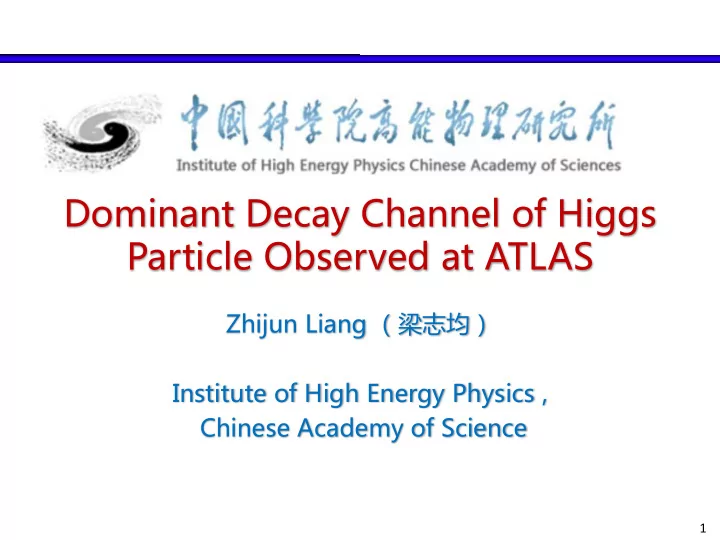

Dominant Decay Channel of Higgs Particle Observed at ATLAS Zhijun Liang (梁志均) Institute of High Energy Physics , Chinese Academy of Science 1
Outline • Introduction to Higgs physics • Introduction to ATLAS experiment • Search for H→bb mode (Dominant Decay Channel) – VBF H→bb analysis – VH(→bb) – H→bb Comination 2
Introduction • Previously known: quarks, leptons, and vector bosons • SM Higgs Mechanism solves two separate problems. – Electroweak symmetry breaking – Fermion masses 3
History of Higgs discovery • July 15: Text in Git ready for editing • July 30: Text editing finalized by team • Aug 1-30: Internal review and iteration on draft • Sept 1: International review 4
History of Higgs discovery (2) 5
Standard Model Lagrangian 6
Higgs Production • df 7
Higgs Decay • H→bb is the Dominant Decay mode of Higgs Boson(58%) 8
Large Hadron Collider 9
ATLAS experiment • df 10
ATLAS Detector phase 0 upgrade from run 1 to run 2 • IBL = New Insertable pixel B-Layer at R=33 mm 11
b quark jets in ATLAS • Light jet rejection power increases by a factor of 10 in run 2 • Two ways to Identify b jets – impact parameters – secondary vertex from B decay 12
Outline • Introduction to Higgs physics • Introduction to ATLAS experiment • Search for H→bb mode (Dominant Decay Channel) – VBF H→bb analysis – VH(→bb) – H→bb Comination 13
The history of H→bb search • Started in LEP , developed in Tevatron, then LHC. 14
Search for SM VBF H(bb)+ 𝛿 • Motivation: Search H→bb decay mode – largest branching ratio ( ~ 58%) , not confirmed yet • VHbb ATLAS (3.5 σ), CMS ( 3.8 σ). • VBF H(bb)+ 𝛿 • VBF 15
H→bb observation in ICHEP2018 • ATLAS collaboration presented H→bb observation result in ICHEP2018 at July 9th • China Science Daily reported this in its front page 16
IHEP contribution to H->bb observation • Three channel contributed to H->bb observation – VBF+ggF, VH,ttH, • IHEP ATLAS team led the VBF+ggF analysis 17
• Introduction to Higgs physics • Introduction to ATLAS experiment • Search for H→bb mode (Dominant Decay Channel) – VBF H→bb analysis – VH(→bb) – H→bb Comination 18
VBF H(bb) analysis • IHEP team propose Search for H->bb in VBF events containing a central photon • Advantages of requiring a photon – extra handle for trigger – suppresses QCD background – Sensitive to WWH VBF production – not sensitive to ZZH VBF VBF H(bb) + 𝛿 VBF H(bb) 19
Event display for VBF H(bb) Photon VBF jets b-jets 20
Analysis strategy Trigger Event pre-selection Boosted decision tree Divide into different categories based on BDT weight Simultaneous M(bb) Fit on all categories
ATLAS trigger system • Three level trigger system – L1 trigger: Calo / Muon ( 75kHz) – L3/Event filter: PC based (~200Hz) • Difficulty – Hard to lower threshold for jets – Typical 4jet trigger (pT>80GeV) – Higgs need lower thresholds • Eg: pT>35GeV 22
Trigger • divided into 3 channels based on triggers: – VBF inclusive • Two central : 4 central jets with 2 bjet(2b+2j) • Four central: 2 central + 1 forward trigger jet (1fj+2b) – VBF+photon • Photon: photon + 2bjet+2 forward jets (γ+2b+2fj ) L1 trigger: 4 central Jet L1: 1 forward jet L1: 1 EM object +2 central jets Four central Two central Photon channel Channel (2b+2j) Channel (1fj+2b) γ+2b+2fj 2 3
Event Selection Four central Photon channel Two central Channel (2b+2j) γ+2b+2fj Channel (1fj+2b) Inclusive analysis veto data events in photon channel orthogonality between different channels 2 4
Boost decision tree analysis • More than 10 variable used in BDT analysis 2 5
MVA Input variable: photon centrality No color connection between VBF jets and b jets in signal 26
Analysis strategy Trigger Event pre-selection Boosted decision tree Divide into different categories based on BDT weight Simultaneous M(bb) Fit on all categories
BDT response • Divide into 9 categories based on BDT weight – Expected Higgs and Z events in 100GeV<m(bb)<140GeV SRIII SRII SRIII SRII SRI SRII SRI SRIV SRI Two central Four central Photon channel 2 8
Simultaneous m(bb) Fit • Simultaneous m(bb) Fit to all 9 regions 29
Results of VBF H(bb) • Observed significance: 1.9σ (μ= 3.0+-1.7) – Analysis sensitivity dominated by the photon channel. • Dominant uncertainty from data statistics – Expect significant improvement with full run-2 data. CERN-EP-2018-140 30
• Introduction to Higgs physics • Introduction to ATLAS experiment • Search for H→bb mode (Dominant Decay Channel) – VBF H→bb analysis – VH(→bb) – H→bb Comination 31
ATLAS-CONF-2018-036 • df 32
VH(→bb) • Two methods: Boost decision base (nominal) and cut based 33
VH(→bb) sensitivity • Each channel contributes 2σ ~3σ significance – Multi-variable (MVA) analysis is better than Cut based (CBA) 34
H→bb combination • First observation of H->bb decay mode ATLAS-CONF-2018-036 • First observation 35
H->bb observation • IHEP ATLAS team contributed to VBF+ggF analysis 36
Higgs result summary in ICHEP • df 37
Summary • First observation of H->bb decay mode – IHEP ATLAS group made major contribution – lead ggF+VBF channel • First observation of VH production mode – Main Higgs production mode in CEPC – Current precision of H->bb coupling about 20% – CEPC can reach precision with 1% 38
IHEP contribution to H->bb observation • IHEP ATLAS team led the VBF+ggF analysis 39
H->bb observation • IHEP ATLAS team contributed to VBF+ggF analysis 40
H→bb observation in ICHEP2018 • ATLAS collaboration presented H→bb observation result in ICHEP2018 at July 9th 41
Recommend
More recommend